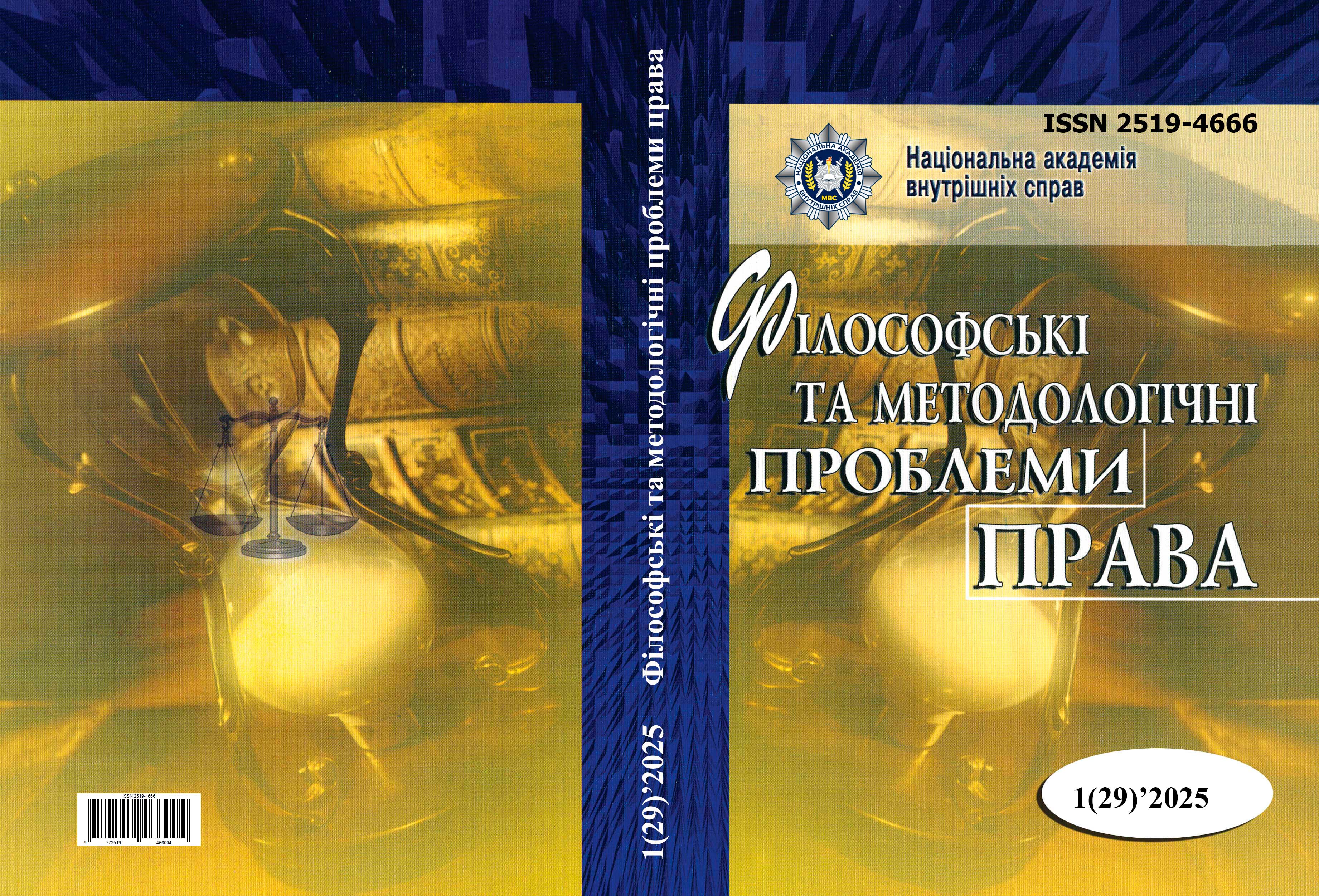Legal Monitoring of Global Legal Systems
Abstract
Abstract. The article is devoted to the analysis of the regulatory and legal prerequisites for conducting legal monitoring of global legal systems. In the course of the study, the author analyzes the domestic regulatory and legal framework and doctrinal developments regarding legal systems, legal monitoring, and globalization. Attention is paid to the ability of domestic regulatory and legal acts to ensure the legal monitoring of global legal systems. According to the results of the study, the author found out that in Ukraine, the instruments for implementing legal monitoring are oriented more towards monitoring the national legal system than the legal monitoring of the system of foreign legal order. Moreover, the issue of ensuring legal monitoring of "global legal systems" can be carried out under the national legal order, but to the extent permitted by regulatory and legal documents. This, in the author’s opinion, may mean the inability to fully reflect the legal monitoring map of global legal systems, which will pose risks for a full assessment of the effectiveness of a particular legal system. The author of the study identified the main areas of legal monitoring of global legal systems and classified the latter.
Analyzing the raised problem of the global legal space on which legal systems are based, the author proposes to classify systems into those that belong to global legal systems ("globalizing", as a result of the influence of internal factors contained in the legal system), and those that are globalized as a result of the influence of external factors. The first, in the author’s opinion, are inherent in strong states and state-political formations. Instead, the author believes that under such circumstances, the People’s Republic of China, the European Union, the United States of America, etc. can be distinguished. That is, those legal systems that are characterized by institutions capable of absorbing other legal systems, correcting them, while extending their social, political, military influence on other legal systems, in fact, which is especially relevant, creating formulas for law-making processes for globalized legal systems.
Keywords: legal monitoring; legal system; globalization; global legal systems.
Downloads
References
Andrushchenko, V.P., Huberskyi, L.V., & Mykhailenko, M.I. (2016). Social Philosophy. History, Theory, Methodology. Kyiv: Yurinkom Inter.
Bocharova, L.L., & Mahda, Ye.V. (2021). The Legal System of Ukraine: Current State and Development Trends. Legal Scientific Electronic Journal, 4, 28-30. DOI: 10.32782/2524-0374/2021-4/4
Hrytsenko, V.H., Sobol, Ye.Yu., & Riabovol, L.T. (et al.). (2018). Integration of the legal system of Ukraine into the European space: state and development paths. V.H. Hrytsenko (Eds.). Kropyvnytskyi: POLIMED-Service.
Husarov, S.M. (2015). The concept and essence of lawmaking in Ukraine. South Ukrainian Legal Journal, 2, 55-59. Retrieved from http://www.sulj.oduvs.od.ua/archive/2015/2/17.pdf
Khaustova, M.H. (2019). Theoretical and practical foundations of the transformation of the legal system of Ukraine in the context of globalization. Comparative and analytical law, 1, 29-33. Retrieved from https://pap-journal.in.ua/wp-content/uploads/2020/08/1.pdf
Korotkyi, T.R. (2007). The correlation of the concepts of “legal system” and "system of law" in relation to international law. Current problems of state and law, 36, 479-487. Retrieved from https://dspace.onua.edu.ua/server/api/core/bitstreams/a7e4ffb7-098f-4e17-874c-752b82d77681/content
Kot, O.O., Hryniak, A.B., & Milovska, N.V. (Eds.). (2022). Lawmaking in Ukraine: prospects for legislative regulation. Odesa: Helvetyka. Retrieved from https://lawmaking.academy/wp-content/uploads/KRTS-Pravotvorchist-v-Ukrayini_print.pdf
Lukianov, D. (2015). The legal system as a subject of comparative legal research: characteristics according to the theory of systems. Bulletin of the National Academy of Legal Sciences of Ukraine, 2(81), 27-35. Retrieved from http://nbuv.gov.ua/UJRN/vapny_2015_2_5
Melnyk, Ya.Ya. (2023). Introduction to the theory of the global social state. Kyiv: Yurydika.
Onishchenko, N.M. (2024). Legal policy as a component of Ukraine's European integration policy: challenges, threats, prospects. Bulletin of the National Academy of Sciences of Ukraine, 7, 51-61. DOI: 10.15407/visn2024.07.051
Ryndiuk, V.I. (2019). Lawmaking as a type of legal activity: praxeological aspect. Bulletin of the National Technical University of Ukraine "Kyiv Polytechnic Institute". Series "Political Science. Sociology. Law", 4(44), 137-142. DOI: 10.20535/2308-5053.2019.4(44).199747
Samokysh, I.V. (2018). Legal systems of modernity: discursive positions. Legal Bulletin, 6, 30-36. Retrieved from http://www.lawbulletin.oduvs.od.ua/archive/2018/6_2018/7.pdf
Sushchenko, V. (2025). The legal system of the state: (in)efficiency of functioning. Site "LB.ua". Retrieved from https://lb.ua/blog/volodymyr_suschenko/666252_pravova_sistema_derzhavi.html
Tatsii, V.Ya. (et al.). (2017). Great Ukrainian Encyclopedia (Vol. 3). Kharkiv: Pravo.
Udovyka, L.H. (2014). Theoretical and legal principles of transformations of the legal system of Ukraine in the context of globalization (Abstract dissertation, Kyiv, Ukraine).
Udovyka, L.H. (2020). Formation of the theory of the legal system in legal science (Part 2). Journal of the Kyiv University of Law, 1, 26-33. DOI: 10.36695/2219-5521.1.2020.03
Voievodina, H.I. (2024). European System of Supranational and State Bodies Regulating the Circulation of Virtual Assets. Scientific Bulletin of Uzhgorod National University. Series "Law", 84(4), 246-251. DOI: 10.24144/2307-3322.2024.84.4.34
Abstract views: 85 PDF Downloads: 62
Copyright (c) 2025 Philosophical and Methodological Problems of Law

This work is licensed under a Creative Commons Attribution-NonCommercial-NoDerivatives 4.0 International License.
- Authors reserve the right to authorship of their own work and transfer to the magazine the right of the first publication of this work under the terms of the Creative Commons Attribution License, which allows other persons to freely distribute published work with mandatory reference to authors of the original work and the first publication of an article in this magazine.
- Authors have the right to enter into separate additional agreements on non-exclusive dissemination of the work in the form in which it was published in the journal (for example, to post an article in the institution's repository or to publish as part of a monograph), provided that the link to the first publication of the work in this journal is maintained.
- The journal's policy allows and encourages the posting of articles by authors on the Internet (for example, in electronic storehouses of institutions or on personal websites), both before the submission of this manuscript to the editorial office and during its editorial processing, as this contributes to the creation of a productive scientific discussion and positively affects the efficiency and dynamics of citing the published work.




